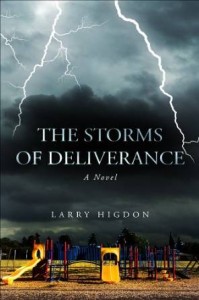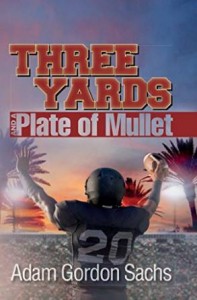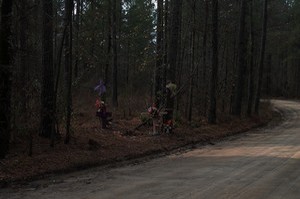This month’s writers show us protagonists who consider, and reflect upon the action around them.
Joan Beebe’s poetic speaker watches a thunderstorm from her window. Safe inside, she can observe the spectacle with wonder and excitement. G.K. Brannen’s piece voices an old-style lament inspired by a roadside memorial for people who died in an accident.
The book reviews here also strike a tone of thoughtful expectancy. Elizabeth Hughes’ monthly Book Periscope column includes a personal essay from the author about why and how she loves to read, which she has typed to fill the space while technical difficulties slowed her reading. While she waits on a computer repair, she looks at one title, Charles Schneider’s The Vale of Years, whose protagonist leaps into action, inserting herself into history for personal gain. Rui Carvalho brings a fresh perspective to Karolina Simos’ suspense novel trilogy The Ambrosia Chronicles, showing how the books inspired not just suspense and curiosity, but consideration of deep existential questions.
Kahlil Crawford looks at professional chef, recovered addict and anorexia survivor Lisa Stalvey’s biography Food Sex Wine and Cigars, the story of how this accomplished businesswoman and artist learned to heal by letting go of what she couldn’t control in her personal life while continuing her professional striving. Stalvey embraces watchful waiting as a position of strength, choosing to focus her energy where she can learn and make a difference. Ryan Hodge, in his monthly Play/Write column, explores the psychology of addiction and why people who become obsessed with a substance or activity feel the need to continue even when they no longer derive pleasure from that activity. Certain video and computer games, including Candy Crush, harness these psychological pathways, making it difficult for players to let go and put down the game.
John Grey’s poems present physical experiences in the natural world, such as preparing to raft down a river and encountering wild animals, in a contemplative way. The speaker observes the world around him and plans his near future, and also reflects on a long-term relationship. Lysious Ogolo’s upcoming musical A Priceless Heart presents a heroine, Lauren, who must choose among her musical aspirations, her working-class Nigerian immigrant lover, and her father, who has big plans for her to inherit and manage the prosperous family business. Lauren seeks the true love that John Grey’s speaker describes, yet has much to consider before she can feel confident in pursuing the romance.
Patrick Ward brings us the somber sound of a whippoorwill in his poetry, along with images of a lighthouse and a ‘quiet man’ who stands apart from others and who is braver than they realize. Yet, as Ward’s bold, capitalized titles reveal, the speaker here may seem quiet, but he is definitely present, clearly aware of and taking in what happens around him. Timothy Drake’s poetry creates more of a rambling, personal, almost diary-like effect, with its short lines and lack of any capitalization. Left alone at the end of a relationship, Drake’s speaker seems to talk to make sense of his feelings in his own mind, rather than to assert his existence or express thoughts to others.
Christopher Bernard’s lengthy piece on restructuring our civilization to better mesh with the natural environment affirms that we as a species are all currently watching a major planetary-level change and suggests broad strategies to redirect our course. Shannon Snyder, in the two essays she has contributed for this issue, describes experiences observing fellow Londoners on the Metro and in museums, and immigrants waiting for needed papers and services before they can make a fresh start in their new homeland.
Poet Michael Robinson considers his heritage, both personal and cultural, in two sets of richly described poetic collections. He draws upon the strength of those he remembers as he personally waits and hopes for a more peaceful environment. As with Christopher Bernard, he lengthens the timescale and widens the geography of his frame of reference to better understand his situation, and as with Shannon Snyder, he shows how chronic social issues and inequities impact individual lives.
This month’s issue provides an excellent opportunity to consider weighty issues and refocus on one’s own life goals. We encourage you to think on these matters while perusing the site.
FYI we are hosting a reception Saturday June 20th or Thursday June 25th, TBA, at San Francisco’s Cafe International, 508 Haight St. Lewis Mark Grimes, artist who creates unique ‘feather rishi’ Egyptian inspired patterns from peafowl feathers printed onto silk scarves, will come up from Southern California for this event to show off his work. All others are invited to read, bring books to sell and share, or just enjoy food and drinks and conversation.
Also, our colleague in Portugal, poet and software developer Rui Carvalho, hosts a poetry contest on his blog and invites all writers to participate. Our magazine staff will provide editorial expertise to judge this competition and provide free writing coaching to the runners-up.
International Literary Contest “Poems and Tales for Nature 2015”
Competition Adjudicator: Rui M.. Prize-giving will be by the end of October 2015 using the web and the website where the results will be displayed.
For further details, rules & entry form visit http://talesforlove.blogs.sapo.pt




